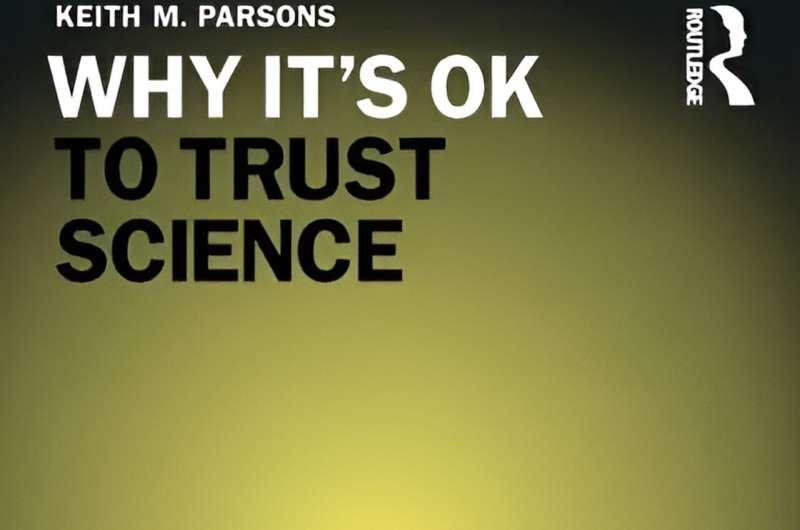This article has been reviewed according to Science X's editorial process and policies. Editors have highlighted the following attributes while ensuring the content's credibility:
fact-checked
trusted source
proofread
Distinction must be made between genuine scientific skepticism and 'dogmatic denial,' warns expert

It's becoming increasingly necessary to distinguish between genuine scientific skeptics and "dogmatic deniers," a new book suggests.
This is one of many compelling observations made in Keith M. Parsons' new book, "Why It's OK to Trust Science."
"Skepticism is essential to science. New ideas, however beautiful or brilliant, must be subjected to the most rigorous vetting that scientific communities can dish out," outlines the Professor of Philosophy and Humanities.
"Skepticism, by definition, is defeasible. That is, when confronted with sufficient evidence, a skeptic will—provisionally—accept the well-confirmed claim. Mere refusal to accept any evidence is not skepticism."
Science and its contentious history
In the 1990s, academic disputes about the role, authority and status of science grew so passionate and embittered, they came to be known as "the science wars."
He notes: "The upshot of these critiques [made by radical feminists, sociologists of knowledge, and postmodernist theorists] was that science is a social construct, an excrescence of politics, white male privilege, rhetoric, intimidation, and subterfuge. Defenders of science replied with vigorous, often trenchant arguments."
Almost 30 years later, Parsons believes that it is vital to examine the issues at the heart of the controversy, many of which remain relevant today.
The emergence of COVID—and its ongoing impact—and the increasing global calls for sustainability and reduced fossil fuel emissions in the face of a warming climate, have firmly fixed anti-vaccination proponents and climate change deniers within public discourse.
Is science absolute?
Parsons identifies philosophical relativist theory at the heart of much science critique—the claim that what is true for one individual or social group or may not be true for another. Relativist thinkers argue that truth is, instead, relative to culture, theory or conceptual scheme.
The book considers different arguments associated with relativism, like the "holism thesis"—the claim that any theory can be made compatible with any evidence by appropriate adjustments in our other beliefs—before decisively rebutting them.
"Most obviously, scientific methods are designed to severely restrict the "wiggle room" in the interpretation of experimental results and focus upon specific hypotheses as the reason for the failure or success of prediction," explains Parsons.
"Further, and equally importantly, theories must jump through many hoops before they even become acceptable candidates for testing vis-à-vis the evidence."
Beyond a reasonable doubt
"Why It's OK to Trust Science" compellingly puts forth the case that science generates objective knowledge, which can be gained even when engaging complex, timely, and even divisive, issues.
Using the climate issue as an example, Parsons deploys scientific research in order to sift through what is necessary skepticism and what is merely "pseudo-skepticism." He calls attention to the different features that set the types of critics apart, such as the type of data they cite.
He says, "Pseudo-skeptics continue to cite data and research after they are out of date—sometimes long out of date. They are also adept at cherry-picking data, that is, citing only data selected to support a favored conclusion."
As issues like global warming become ever more urgent, the ability to discern between the different forms of scientific critique becomes equally so. "Why It's OK to Trust Science" urges readers—within and beyond the scientific community—to examine their own understanding of the field and be willing to have their opinions cemented, demystified or even debunked.
More information: Keith M. Parsons, Why It's OK to Trust Science (2023). DOI: 10.4324/9781003105817
Provided by Taylor & Francis





















